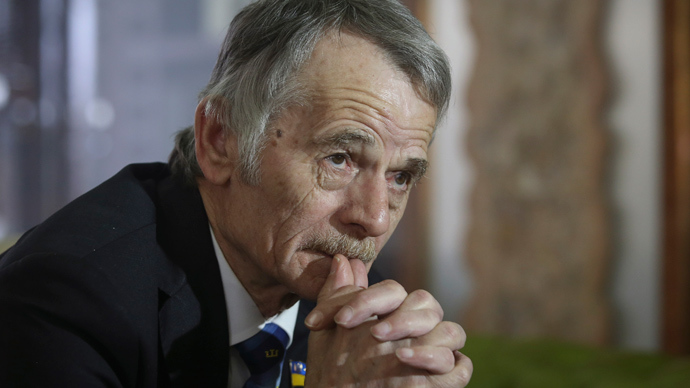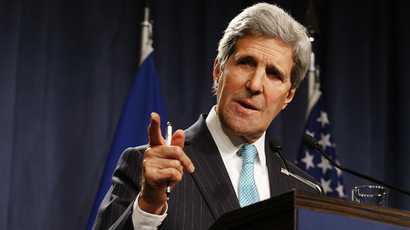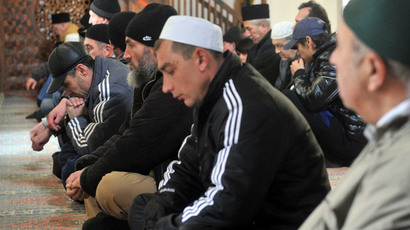Russia denies travel ban on Crimean Tatar ex-leader

Russian authorities have denied reports that Ukrainian MP and former Crimean Tatar leader Mustafa Dzhemilev had been slapped with a 5-year entrance ban to Crimea. Dzhemilev claims he was given a travel restriction order on the Russia-Ukraine border.
A spokesman for the Russian Federal Migration Service (FMS) told Ukrinform that the agency does not have any information on the travel ban imposed on the Ukranian MP from the Batkivshina Party and a former head of the Crimean Tatar Mejlis, Mustafa Dzhemilev, to enter Russian territory.
“We do not have such information. Therefore, why do you think that we have banned him from entering the Russian Federation? I can send you the same document, you can also send it to me. I've seen it, and there is really nothing to comment on here.”
The FMS representative called the ‘document’ that Dzhemilev claims he was handed on Tuesday and posted on Mejlis website “just a piece of paper.”
“It's just a piece of paper that someone wrote to someone without attaching an official seal or a signature,” said the spokesman, as cited by Ukrinform. “We do not comment on such papers.”
The Crimean parliament has also denied allegations of issuing such a ban on Dzhemilev, saying that his name is not included in the officially compiled travel restriction list which now has over 340 names.
“The State Council did not take any decisions restricting entry and exit of Mustafa Dzhemilev to the territory of Crimea,” the Deputy Chairman of the Crimean parliament Konstantin Baharev told Ria Novosti.
“Earlier, the Presidium of the Crimean parliament formed a list of more than 300 persona non grata from Ukrainian MPs who opposed the Crimean initiative to hold a referendum on self-determination.”
The apparently fake ‘Notification of non-permission of entry to the Russian Federation’ without any official insignia or seal was allegedly handed over to Dzhemilev early on Tuesday morning on the border of Russia and Ukraine when the MP was en route from Crimea to Kiev.
Unsigned and without letterhead, the paper said that “Mustafa Dzhemilev ... citizen of Ukraine” was barred entry to Russia on the basis of federal law for five years or until April 19, 2019.

Dzhemilev was quick to spread the forged paper online commenting that the alleged ban serves to show “nothing more than an indicator of how 'civilized' is the state we're dealing with,” referring to Russia, local media quoted him as saying.
But speaking to Ukraine's Channel 5 TV, Dzhimilev acknowledged the lack of signature and said he was not certain that the document came from the Russian government, because the man who handed over the alleged ban did not identify himself. He said he intends to continue his travels to Crimea.
Meanwhile, the incumbent Crimean Prime Minister Sergey Aksyonov said Dzhemilev attempted to organize provocations in the republic aimed at sparking inter-ethnic conflicts.
“Dzhemilev came to Crimea with specific provocative goals. And what he was doing here can be described only as a provocation aimed at ethnic clashes between people,” he told journalists.
Olga Kovitidi – who represents Crimea in Russia’s upper house of parliament – said that Dzhemilev has now become “a political leader without people” as Crimean Tatars are not interested in political confrontation with the government, but “want to live in peace and have true leaders who care about tomorrow for the people.”
Premature accusations of Russia being behind the ban is “cheap anti-Russian populism and nothing more,” member of the Presidential Council on Civil Society and Human Rights, Vladimir Shaposhnikov told Ria, adding the MP should first get acquainted with the document he received, double check the laws, and then make accusations.
“Now I can only see much ado about nothing. Before raising the cry Mr. Dzhimilev is should have first of all checked the law 'On the Procedure for Exit from the Russian Federation and Entry into the Russian Federation' and read the article on the basis of which he was allegedly denied entry,” said Shaposhnikov.
But Washington was quick to support Dzhimilev's statements that he has made after his return from Crimea, in particular accusations the Russian Security Service is keeping a close watch on the Tatar poulation of Crimea.
“Today, Crimean Tatar community leader, Mustafa Dzhemilev, who has been in Washington a couple weeks ago and had meetings here in this building, gave some alarming remarks. And he said that – warned today that possible bloodshed in Crimea and southern Ukraine is coming up, and he also stated that some of the FSB officers from Moscow who hope to promote new deportation of the Tatars,” State Department's spokeswoman Jen Psaki told reporter on Tuesday.
On Monday president Vladimir Putin signed a decree ruling Stalin's 1940s deportation of Crimean Tatars and other ethnic minorities on the peninsula was illegal.
“We must make sure that as part of Crimea’s integration into Russia, Crimean Tatars are rehabilitated and their historic rights restored,” the Russian leader said during an official meeting in Moscow. The decree also allowed Tatar education in their native language.
This is not the first time over the last few weeks the US has backed its rhetorical comments for the Western media with questionable documents presented as hard evidence.
Last week a letter urging the Jews of Donetsk to get registered or have their citizenships revoked, was presented as factual evidence of chaos and widespread human rights abuses by the US Secretary of State in Geneva. The letter turned out to be a fake according to a man whose name was typed on the communication.
On Sunday, the White House endorsed a set of photographs allegedly proving that armed men in Eastern Ukraine are members of Russian military and intelligence forces. The self-installed government in Kiev presented these photographs last week to the Organization for Security and Cooperation in Europe (OSCE), claiming that they document Russian combatants in Ukraine, allegations Russia denies. The US State Department maintains that the Ukrainian materials are convincing enough to be called evidence.
“Ukrainians presented a range of photos in Vienna just a few weeks ago. There have been a range of photos available in international media, available on Twitter and social media sites that have portrayed a range of events,” Psaki said Tuesday.
#Ukraine update 1: Photographic evidence of Russian involvement in unrest in east Ukraine. http://t.co/mEH7Wbt6Mtpic.twitter.com/41SYYbYPXB
— Jim Roberts (@nycjim) April 21, 2014
“We still feel confident that there is a strong connection between Russia and the armed militants in eastern Ukraine across the board. It’s – we’ve seen similar steps that – or similar behavior we saw in Crimea just a couple of weeks ago. And we are obviously watching what is happening on the ground very closely.”
The former head of Mejlis, an organization which has been steadily losing its influence in the Crimean Tatar community, Dzhemilev showed strong opposition to Crimea's vote of self-determination. On the eve of the March referendum he was calling on Crimean Tatars, who make up 12 percent of population in Crimea, to ignore the vote. In the meantime Refat Chubarov, the acting chairman of Mejlis, recently told local radio that he was planning to receive a Russian passport and stay in Crimea.














